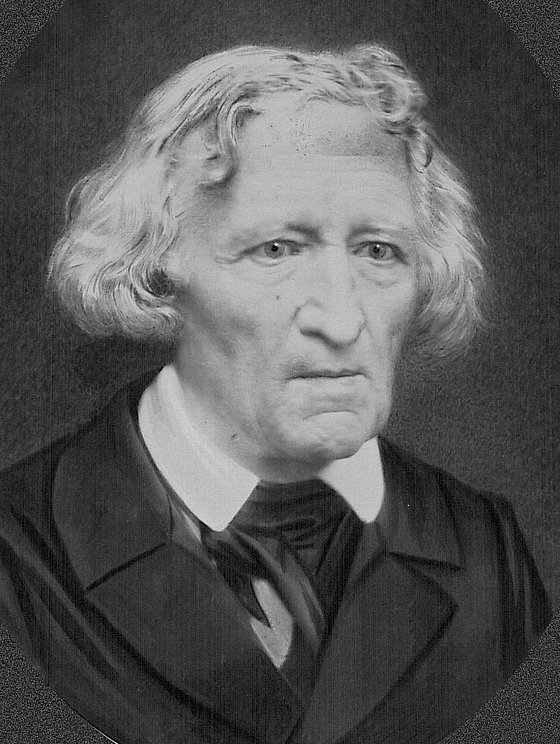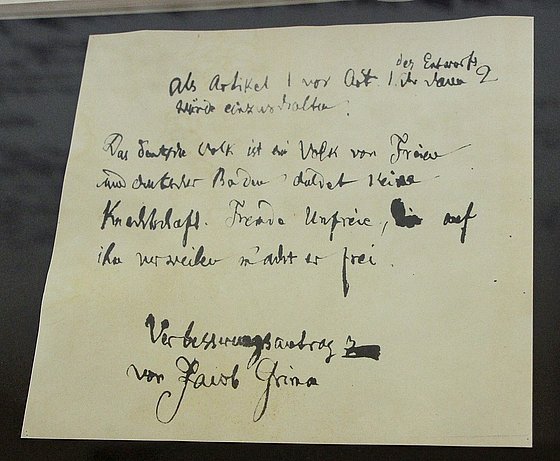
The Brothers Grimm: Politically minded contemporaries
Apl. Prof. Dr. Ewald Grothe / History
Photo: UniService Transfer
The Brothers Grimm were politically minded contemporaries
Prof. Dr. Ewald Grothe on a remarkable pair of siblings
"Once upon a time... ." People all over the world associate fairy tales with these words. They were collected more than 200 years ago by the brothers Jacob and Wilhelm Grimm in the world-famous "Children's and Household Tales", which themselves went down in history. But the Brothers Grimm were much more than just collectors of fairy tales. Politically and academically, they had a lasting influence on the development of German politics and language. Prof. Dr. Ewald Grothe, historian at the University of Wuppertal, focuses on the two founders of German studies, who represented their political opinions with courage and civil courage throughout their lives. "They were Germanists, but had originally also studied law in Marburg," explains Grothe. However, this all took a while, because after their studies they were initially librarians in the state capital of Kassel and were appointed professors at the University of Göttingen in 1830. However, they achieved fame through their publications of the Children's and Household Tales (1812/15) and the "German Dictionary" (1838 ff.).
Children's drawings bear witness to early political influence
Even as children, politics had a strong influence on Jacob and Wilhelm Grimm. "They were born in 1785 and 1786, shortly before the outbreak of the French Revolution. The revolution was followed by Napoleon and the turmoil of the revolutionary events and Napoleon's subsequent wars, including the occupation of Germany, meant that they were influenced by politics at a very early age," says the historian, citing a vivid example. "In 1797, as teenagers, they made a drawing together showing the execution of the French King Louis XVI. That is quite remarkable, but it has to do with the fact that the family, all lawyers and priests, certainly talked a lot about politics, so that even this children's drawing basically expresses the mood of the times they were confronted with. If a child aged 10 or 11 were to come home today with a drawing of an execution, their parents would certainly react with extreme concern."

Jacob Grimm (1857)
in the public domain
Fairy tale collection should awaken historical and national consciousness
Politics also had a decisive influence on the fairy tale collection, explains Grothe, because "the first volume of the fairy tale collection was published in 1812 and the second in 1815 and was created from a compilation of fairy tales told by the Brothers Grimm. So they didn't write them themselves, but some of them came from French and Italian models and sources, which then came to Germany via the Huguenots, for example." The collection was therefore created at a time when a great deal of German and European traditions were also collected in the brothers' environment in order to explore the respective "folk spirit". "This also included German folk songs. This collecting activity was intended to awaken a sense of history and national consciousness in the age of Romanticism, when Germany was occupied by the French."
The "German Dictionary" and the temporary end of a career for the Göttingen Seven
Jacob and Wilhelm Grimm and their Stuttgart publisher had already planned to compile the first German dictionary around 1830. However, Grothe reports that the project was implemented out of financial necessity, as the following happened in 1837. "The Grimms were now working as professors in Göttingen and the new Hanoverian king, Ernst August I, a British prince - Hanover was in personal union with Great Britain - suspended Hanover's rather liberal constitution from 1833. The Grimms and five other professors, the famous Göttingen Seven, protested against this and were all dismissed as a result. Two of them, namely the historian Friedrich Christoph Dahlmann and Jacob Grimm as the ringleader, were also expelled from the country. As a result, the Grimms and the other five professors became unemployed for the time being. The plan was therefore implemented to create a 'German Dictionary', which would simply serve as a source of income." The creation of the "German Dictionary" and the dismissal of the Göttingen Seven is thus a testimony to the direct connection between political events and the creation of a scientific product.
Not politicians, but politically minded contemporaries
"Basically, the Grimms were never politicians, but they were politically-minded contemporaries. This applies to both brothers, although Wilhelm limited his political opinions to private correspondence and a few newspaper articles," reports Grothe. The situation was completely different for Jacob Grimm, who had already been in the service of King Jérôme, a brother of Napoleon, who was King of Westphalia at the time, as a librarian in the late 1800s. As a result, he had direct contact with politics. But Jérôme had to flee in 1813, Napoleon's reign came to an end and the former elector, Wilhelm I, returned to Kassel. "He then sent Jacob to the Hessian legation in Vienna. Jacob thus became secretary to the legation and was present in Vienna in the run-up to and around the Congress of Vienna, planning the restoration of Germany, a possible German Empire." Jacob Grimm also worked academically during this time. Among other things, he analyzed manuscripts in the Vienna library, compiled a list of art objects abducted from Kassel in Paris and arranged for their return. "His attitude towards the Elector was very critical because he deplored his outdated regime and Jacob Grimm, who was open to reform, also clashed with his brother-in-law, Ludwig Hassenpflug, who became the conservative Minister of the Interior and Justice in Hesse in the 1830s, over issues relating to the constitution and fundamental rights." In 1840, both brothers were re-employed by the Prussian King Friedrich Wilhelm IV, who appointed them as professors at the Prussian Academy of Sciences in Berlin. In 1848, Jacob was finally elected to the Frankfurt National Assembly.

Grimm's proposal to improve the fundamental rights of the German people, which was not adopted.
CC BY-SA 4.0
Cologne newspaper calls for Jacob Grimm's election to the National Assembly in 1848
Over the years, Jacob Grimm had made a name for himself in political and academic circles. "By 1837 at the latest, he had exposed himself politically to such an extent that he was considered a liberal star, as they said at the time," says Grothe. What's more, some even saw him as a martyr who had even accepted his dismissal for his convictions. "When he was elected to the National Assembly in 1848, a Cologne newspaper finally called for Jacob Grimm to be elected because he was such a famous man, such an important scientist who had already stood up for the German nation. And then, curiously enough, he was elected in a constituency in Mülheim an der Ruhr. This did not depend on his place of residence, as he was living in Berlin at the time, but he was then able to move into the Paulskirche in Frankfurt." Grimm presented a draft for the first article of the Basic Rights in the National Assembly, which read: "The German people is a nation of free people and German soil does not tolerate servitude. It makes free the foreign unfree who dwell on it." However, his proposal for improvement was rejected by a narrow majority and he soon retired to private life, especially as he was already 63 years old at the time.
"Jacob and Wilhelm Grimm are still good role models today," concludes Grothe, "because with their courage to stand up for a constitution in 1837 that had been willfully repealed, they showed civil courage that we can use at all times when it comes to essential human rights, fundamental or constitutional rights and democracy."
Uwe Blass
Prof. Dr. Ewald Grothe studied history, public law and legal history in Marburg. He habilitated in Wuppertal in 2003 and teaches modern and contemporary history at the University of Wuppertal. He has been an adjunct professor since 2009. Since 2011, he has headed the Archive of Liberalism at the Friedrich Naumann Foundation for Freedom in Gummersbach. He has been Chairman of the Brothers Grimm Society in Kassel since 2017.
